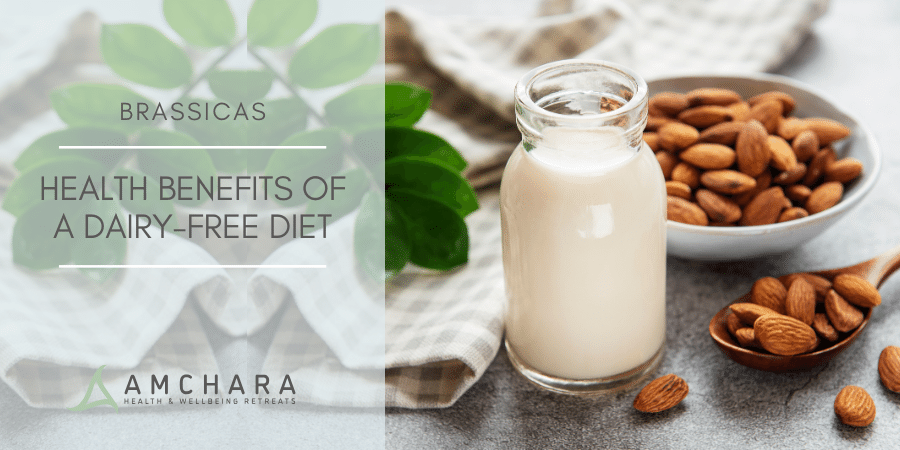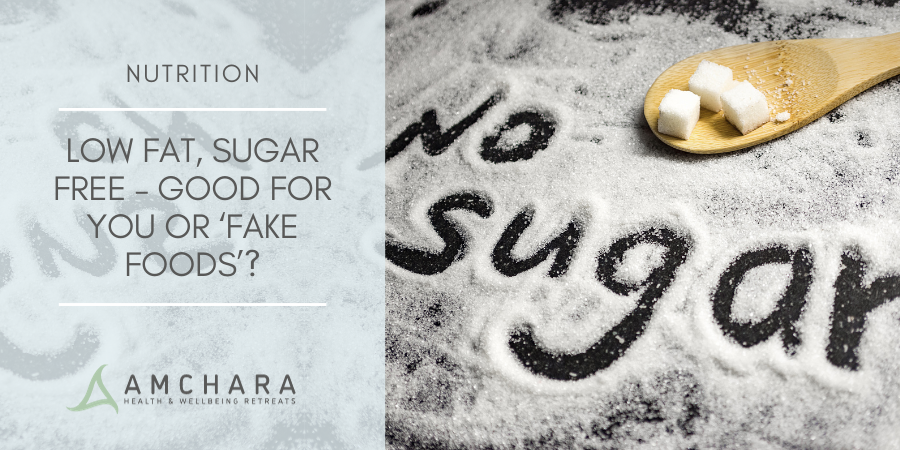Health Benefits of a Dairy-Free Diet
Firstly, let’s have a look at the common miss-conceptions surrounding dairy and the important role it plays in our diets.
The NHS recommends everyone to consume dairy products including milk, cheese and yoghurt in their diets due to their protein and calcium content.
These claims are not untrue, but are simplistic, there other ways we can get these substances in our diet.
The main consideration is why would we want to cut down or remove dairy though?
1. Calcium builds strong bones.
Whilst we do need some calcium there are now studies that have found that further suplementation of Calcium has no benefit in frature rate or osteoporosis.
Vitamin D has been proven to be much more important than calcium as a preventative measure.
2. Can you stomach it?
About 75 percent of the world’s population, including 25 percent of those in the U.S., lose their lactase enzymes after weaning.
This can cause bloating, IBS and other digestive disorders in some individuals.
3. Calcium may raise cancer risk.
Research shows that higher intakes of both calcium and dairy products may increase a man’s risk of prostate cancer although this hasn’t been definitively proven.
Additionally, dairy consumption increases the body’s level of insulin growth-like factor (IGF-1) — a known cancer promoter.
4. Calcium isn’t just found in dairy.
Calcium is also found in whole plant foods — vegetables, fruits, beans, whole grains, nuts, seeds, and seaweed.
So you don’t have to rely on milk as your source of the mineral.
5. Dairy has been linked to other health conditions.
There are symptoms that have been attributed to dairy consumption including; sinus problems, ear infections, allergies, chronic constipation, headaches and IBS.
With all of this in mind it does ask the question if you should consider how much diary you should consume?
Clearly the studies referenced above mostly push the subject into the grey rather than give a definitive yes or no on the subject of Diary consumption.
However we do have some handy tips to consider when choosing dairy products or if you are looking to eliminate it from your diet altogether.
- Don’t rely on dairy to keep your bones healthy. Instead focus on getting plenty of exercise and vitamin D through sun exposure or supplementing if necessary.
- Get calcium from other foods in addition/instead of dairy – green leafy vegetables, seaweeds, sardines and tahini are all high in calcium.
- If you can tolerate dairy, only consume raw, organic dairy products. Fermented products such as kefir are easier to digest as the fermentation process partially breaks down the lactose molecules.
- Try giving up dairy for 2 weeks and see if you notice a difference with symptoms including IBS, sinus issues and headaches.
Whether or not you choose to give up dairy, be conscious of your dairy intake and try making some swaps and substitutes for dairy-free alternatives and see if you feel a difference in your energy levels and wellbeing.
Top Alternatives to Cow’s Milk
(and why we don’t recommend soya)
Most of you reading this blog will be well aware that eating dairy isn’t the healthiest of diets and many of you will probably be on a dairy-free plant-based diet.
So you will know that dairy isn’t good for the body because it’s hard to digest, and that dairy-free alternatives are much easier on the body’s digestive system.
But many people who choose a dairy-free diet often select soya milk and other soya based dairy alternatives, when in fact these are no good either and at Amchara we don’t recommend soya dairy alternatives. There are certain risks associated with soya.
Why Is Soya Milk Not A Goof Alternative To Dairy?
The majority of soya products that you see on the shelves are GM (genetically modified), with soy being in the top 5 most genetically modified products.
And we’re sure that GM risks are all too familiar with you, especially if you read our blog and Facebook page regularly.
But we will explain for those of you who might not be aware of why GM foods are not good news.
GM produce is the product of crops that have been genetically modified and quite often, the engineering process that is used to modify the crops includes radiation or harmful chemicals, which can be harmful to humans if consumed for long periods or in large quantities.
It has in some studies been linked to cancer and other severe illnesses.
In Europe, while unprocessed soya has been ruled unfit for consumption and is not approved for sale.
That says it all.
As you can imagine, there are countless studies into the effects of GM foods and as more are conducted the risks of GM foods are becoming clearer.
Unfortunately, the health effects on humans are not clear as GM foods have only been introduced to the food chain in recent years, but the studies are beginning to uncover the truth, and the overall health of Western people speaks volumes too.
It is estimated that more than ninety percent of global soy crop is manufactured by Monsanto, a HM produce company who are constantly being boycotted by those who understand the dangers and risks that Monsanto are putting the human race in. Monsanto’s GM foods are contributing directly to illness and health issues.
So, now that you understand why soya products aren’t a very good alternative, you’ll be asked which alternatives are.
We have put together a list of some good dairy-free milk alternatives that you can drink, cook with and add to recipes and you can feel free to mix and match depending on the use.
Amchara’s Top Dairy-Free Milk Alternatives
Almond Milk
Almond milk is a really great alternative and one that we use here regularly at Amchara.
And it contains lots of lovely nutrients that help to ward off illness too.
Firstly, it is a great source of magnesium which helps to break down the foods that you eat and it also contributes to bone and muscle health.
It also contains high levels of vitamin E which is a powerful antioxidant, selenium which supports the immune system, the thyroid glands and the metabolic system, and manganese which helps to control blood sugar levels.
Almond milk also contains unsaturated fats (omega 3 and 6), flavonoids, potassium, and protein and doesn’t contain as much sugar as soya milk.
It is a more environmentally friendly option than any animal product.
Rice Milk
For those who are very sensitive, rice milk is a good choice as it’s the most hypoallergenic of the ilk alternatives and it is full of nutrients.
It contains just 1g of unsaturated fats per cup, helps to lower cholesterol levels, contains high levels of magnesium, niacin and vitamin B6 and its high iron and copper content increases oxygen levels in the blood.
But it does come with its disadvantages too.
Rice milk is quite starchy and it also contains simple carbohydrates that convert to sugar very quickly (around 4 times more than soya milk).
Rice milk is not suitable for diabetics either due to the simple carbohydrate content which can cause a sugar spike.
It is also low in protein and calcium so you need to choose a rice milk that is fortified with these.
Oat Milk
Oat milk is another lactose-free milk with no cholesterol.
One of the best advantages of oat milk is that it is high in vitamin E, which is a strong antioxidant.
It is also high I folic acid which is an essential pregnancy nutrient and it is also a great choice for anybody with allergies as it is a plant-based source it doesn’t trigger allergy reactions for most people.
Oat milk contains lots of phytochemicals too which protect against heart disease, heart attack, cancer and strokes.
It is not however suitable for people who have a gluten intolerance or allergy, and again it doesn’t contain much protein or calcium so needs to be fortified.
Its taste is also very oaty (sorry to state the obvious), but this is important to note as it’s not everybody’s cup of tea.
Hemp Milk
If you have a nut or gluten allergy and find your choices are limited, hemp milk is certainly an option to explore.
It is rich in omega fatty acids, contains no lactose o cholesterol and is naturally low in sat-fats.
It contains lots of protein unlike many other milk alternatives, and it also has a really lovely creamy flavour and texture and it is thicker than some of the other substitutes.
On the downside it’s harder to get your hands on but you can order it online or get it from health food shops.
Again, calcium levels are low so you need to either go for fortified products or take calcium supplements (or of course eat a much more calcium-rich plant-based diet).
Cashew Nut Milk
Cashew nut milk contains high levels of magnesium which is great for the health and compared with other nut milks, it contains less total fat.
You can actually make your own cashew nut milk at home which makes it a cheap option.
Coconut Milk
Coconut milk is probably one of the tastiest alternatives to cow’s milk.
It is a very creamy milk substitute and is great if you like a low carbohydrate diet. It is free of gluten, nuts, lactose, cholesterol and soya making it ideal for those with allergies and intolerances.
Coconut milk is rich in lauric acid which is also found in human breast milk, and this acid is known to have antibacterial and anti-viral abilities.
The saturated fat content is much higher in coconut milk, so it is best not to go overboard and perhaps save it for use in cooking and tea, while using other milk alternatives for use with cereal and to drink.
If you are unsure about the effect of diary you can contact us to discuss a food allergy test or consider a stay at a retreat to have our health team talk through it with you.
READ NEXT





